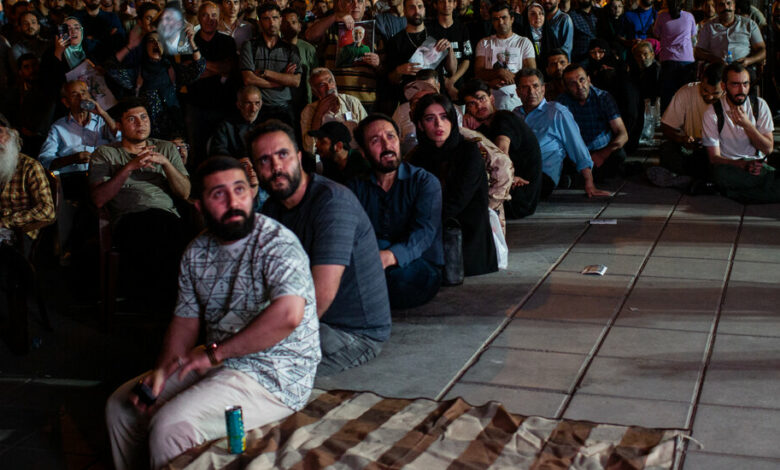Iranian voters face stark choice in competitive presidential election cycle

One promised to confront Iran’s enemies, the other promised to make peace with the world. One plans to double down on social restrictions, the other promises to ease stifling rules for youth and women. One identifies as an Islamist ideologue, the other as a pragmatic reformer.
The race to become Iran’s next president has become a fiercely competitive one, with the outcome difficult to predict for the first time in more than a decade. The winner will be determined in a runoff on Friday, after the previous week’s general election failed to produce a candidate with the required 50 percent of the vote.
The outcome could depend on how many Iranians who did not vote in the general election decide to participate in the second round. Turnout was low last week at 40 percent, with the majority of Iranians boycotting the vote out of anger at the government or out of alienation and apathy over the failure of previous governments to implement meaningful change.
Voters are faced with a choice between two very different visions of how to govern the country as it faces a multitude of challenges at home and abroad. The two candidates represent the extremes of the political spectrum: an ultra-conservative hardliner known for his dogmatic ideas, Saeed Jalili; and a reformer, Dr. Masoud Pezeshkian, who has gained support among voters by calling for moderation in both foreign and domestic policy.
Mr Jalili rejects any deal with the West and says Iran should build its economy by expanding ties with other countries, mainly Russia and China. A former nuclear negotiator, he opposed the 2015 nuclear deal as too concessionary and supported the mandatory hijab law for women and restrictions on the internet and social media.
Mr Pezeshkian has promised to revive the economy by negotiating with the West to lift sanctions. He has promised to abolish the morality police that enforce the hijab law, as well as lift internet restrictions and trust technocrats to run the country.
“This election is about competing currents, not about competing candidates per se,” said Sanam Vakil, Chatham House’s Middle East director. “The currents reflect an attempt to preserve revolutionary values, Islamic ideology and the idea of resistance within the Iranian state versus an alternative that is not quite reform, but a more moderate and open social and political environment.”
In Iran’s theocratic system of government, the president does not have the power to overturn major policies that could bring about the kind of change that many Iranians would like to see. That power rests with the Supreme Leader, Ayatollah Ali Khamenei. Two previous presidents who were elected overwhelmingly promised change but failed to deliver, leading to widespread disillusionment.
Yet the president is not entirely powerless, analysts say. The president is responsible for setting the domestic agenda, choosing cabinet members and even exerting some influence on foreign policy.
Mr Khamenei said on Wednesday he was disappointed by the low turnout in the first round of voting and acknowledged some dissatisfaction with Islamic rule. But he rejected attempts to equate the low turnout with a rejection of the system and called on people to vote.
“We have said this repeatedly,” he said. “The participation of the people is a support for the system of the Islamic Republic, it is a source of honor, it is a source of pride.”
Mr Khamenei voted early Friday morning at the religious centre attached to his compound, state television showed, throwing his ballot into a box on a lone table in a large hall and waving.
“At this stage, of course, people should be more determined and get the job done,” Mr. Khamenei said, giving no indication of which candidate he supported.
Polling stations opened at 8 a.m. Friday and are expected to close at 10 p.m., though an extension is likely. Many Iranians vote in the evening because of the summer heat.
Turnout is expected to be slightly higher due to the high level of polarization, but also because many people fear an extremely hardline government. The Interior Ministry said that representatives of both candidates would be present at polling stations during voting and counting of votes.
Mr. Jalili is part of a marginal but influential hardline political party known as Paydari, whose followers look up to him more as an ideological leader than a politician. Dr. Pezeshkian, a cardiologist and former health minister and member of parliament, was until recently not well known outside political and health circles.
Their team of advisers and campaign staff reflects the vast differences in their policies and offers voters a glimpse into what different governments might look like.
Mr. Jalili’s team is made up of conservative hardliners who promise that his presidency would continue the “resistance” policies of former President Ebrahim Raisi, whose death in a helicopter crash in May prompted emergency elections. Military commanders and senior clerics have backed him and praised his zeal in religious and revolutionary causes.
Dr. Pezeshkian has assembled a team of seasoned technocrats, diplomats and ministers, including former Foreign Minister Mohammad Javad Zarif, who are traveling the country to support him, particularly by warning of doomsday if Mr. Jalili is elected.
“The elections on Friday, July 5, are about the future,” Mr. Zarif said Tuesday, speaking at a virtual town hall meeting on the social media app Club House, where thousands of Iranians gather each night to discuss the election. “In reality, we are having a referendum. These two choices are as different as night and day,”
Reformers are counting on measurable desertions from the conservative camp, where Mr. Jalili has long been a divisive figure. Many conservatives see him as too extreme, analysts say, and fear that his presidency will deepen the rift between the government and the public and put Iran on a collision course with the West.
Polls by government agencies showed that a significant number of voters who supported the moderate conservative candidate, Mohammad Baqer Ghalibaf, the speaker of parliament, would flock to Dr. Pezeshkian to block Mr. Jalili’s presidential chances.
Many Iranians are still determined to boycott the vote. Mahsa, a 34-year-old accountant in Isfahan, said she would not vote and did not believe the logic that she had to choose between “bad and worse.”
Others said in interviews and on social media that they had changed their minds, largely because they were terrified by Mr. Jalili’s rise.
Babak, a 37-year-old businessman in Tehran who asked that his last name be withheld for fear of retaliation, said he and his family members would break their boycott and vote for Dr. Pezeshkian. “We kept going back and forth about what to do, and in the end we decided that we had to try to stop Jalili, otherwise we would suffer even more,” he said.
A prominent political activist who did not vote in the first round, Keyvan Samimi, said in a video message posted on social media from Tehran that he had decided to support Dr. Pezeshkian. “We are casting a protest vote to save Iran,” he said. The fury against Mr. Jalili has grown as the vote approaches. Prominent political figures have compared him to the Taliban and accused him of running a “shadow government.”
Mr Jalili’s supporters have pushed back, accusing the reformers of name-calling and fear-mongering. They have countered by portraying Dr Pezeshkian as a puppet of the former moderate president, Hassan Rouhani. They have said the doctor has no real plan and has overstepped the mark on issues that fall outside his remit as president — notably his promise to abolish the much-despised morality police and normalize ties with the United States.
Reza Salehi, 42, a conservative who works in public relations and campaigned for Mr. Jalili, said in an interview from Tehran that “Mr. Jalili is absolutely not dogmatic.” He added that the candidate was better prepared to govern and that the so-called shadow government looked more like a think tank and not the sinister plot his rivals claimed.
Analysts say the outcome of the second round of the election is difficult to predict. Dr. Pezeshkian may have been allowed to run as a token reform candidate to increase participation, some say, but he has become a wild card in any case.
“The two candidates are neck and neck and it is not clear whose name will come out of the ballot box,” Nasser Imani, a political analyst in Tehran, said in a telephone interview. “What is certain is that in this election, saying ‘No’ is the trend. No to the election or no to this candidate, no to that candidate.”
Leily Nikounazar contributed to the reporting from Belgium.




